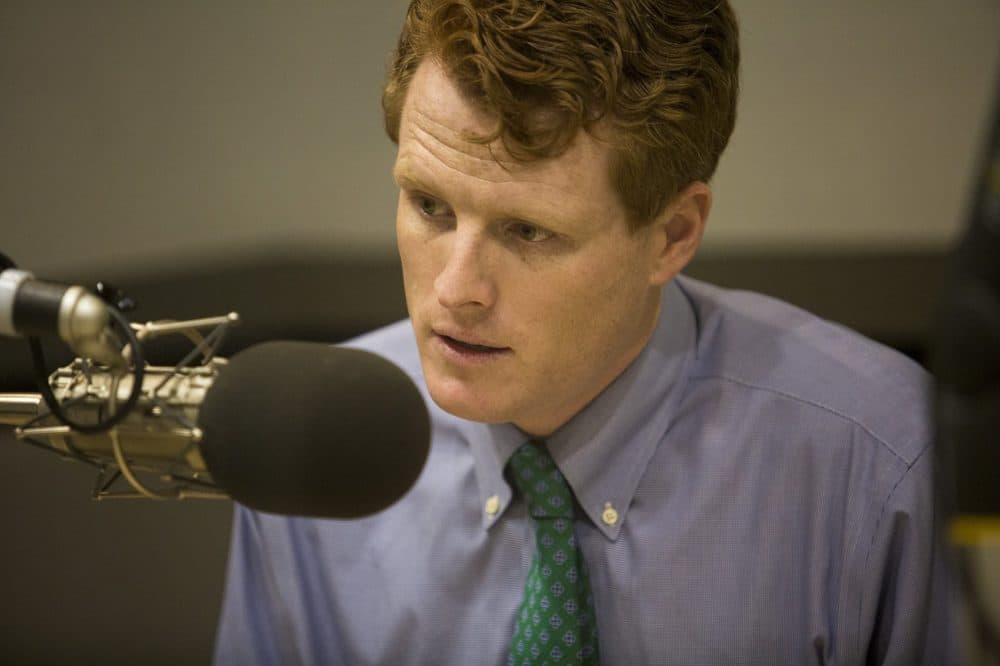Advertisement
Rep. Kennedy Reflects On His Time In The Mass. Congressional Delegation
Resume
The Massachusetts congressional delegation remained largely intact after the 2020 election, with all but one incumbent lawmaker keeping their seat.
The exception was Joe Kennedy III, who, after eight years representing Massachusetts' 4th District, will step aside in January. Kennedy mounted an unsuccessful bid to unseat Massachusetts Sen. Ed Markey.
Kennedy joined WBUR's Morning Edition host Bob Oakes in December to discuss his time on Capitol Hill and the road ahead.
Interview Highlights
On his time spent representing the 4th District:
"I'll remember families that we tried to help. Issues around trans rights. Meeting with parents who had lost their children to gun violence in Boston. The opportunities to travel the country and meet people who are struggling and striving, but advancing themselves, their families and our country."
On his unsuccessful run for U.S. Senate against fellow Democrat Ed Markey:
"I do believe primaries are healthy for a democracy. Democrats as a party — and certainly our system — should not devolve into one where we basically say that if you've won the seat once, you're able to have the opportunity to run unchallenged in perpetuity. I'm proud of the race that I ran; I'm proud of the issues that we highlighted and the support I was able to generate.
"There's parts of the race that surprised me. I have ... deep respect for Sen. Markey and the contribution that he's made. I was surprised at the level of vitriol that came my way at times, and I'm not sure that was warranted or healthy."
On ideological divisions within the Democratic Party:
"I'm not sure you can wholly reconcile it, right? And I think that's actually a hallmark of a healthy, diverse party. If you strive to actually be a big-tent party, which I believe a Democratic Party should be — celebrate that diversity and those common threads that unite us as Americans, as human beings — if you have that diversity, you're going to have differing views on how to get there. And what Democrats have to strive to do is get back to those threads and I think elevate that conversation in a way that actually strikes the chord on values without vilifying other parts of our party and parts of our country that are striving for that same goal, but might not wholly understand the language that is used — or might find some of that language not wholly reflective of what they perceive that policy to be. And look, I think there's a lot more listening that needs to be done.
"And to the extent that that folks say, 'Hey, Democrats are going to settle this debate...' No, we're not. We shouldn't. We're not the party that says it lines up behind uniformity of opinion ... We are, I think, a party that says, 'Hey, this is a big, loud cacophony of voices that is involved in this experiment, but we are going to keep striving to bring more people in.' "
On the deep political divisions in our country:
"I think the president-elect has been doing a tremendous job trying to heal the division. In trying to say, 'Hey, let's give each other a chance. Let's recognize the commonalities we share as Americans and fight for that common future.'
"I think that change in leadership is critical, I think it's necessary; but obviously it's not sufficient. This is something that each and every one of us has to do, and so, yes, I think when you see hate and bigotry and racism and misogyny play out on our streets, then yes, you call it out for what it is. We leave that no quarter. But it also, I think, calls on all of us to do a bit more listening. To understand why even in a state that is as quote-unquote 'progressive' as Massachusetts, that Donald Trump still has — his voice still resonates here. Particularly in communities that I represent, communities like Fall River, which I think, when Bush and Cheney ran they only got about 20% of the vote and Donald Trump got over 40% of the vote there in this past election.
"So it's worth giving some thought, particularly for a progressive movement that says we want to care about the people that are being left behind ... We care about those folks and want to bring them along. Well, let's do some soul searching as to why many of those places are, in fact, voting for our opponents. Let's do some soul searching about what needs to be done, not just in terms of policy, but in terms of representation, in terms of presence, in terms of elevating those voices and celebrating them, to make sure that they have a seat at the table too."
This segment aired on December 4, 2020.

